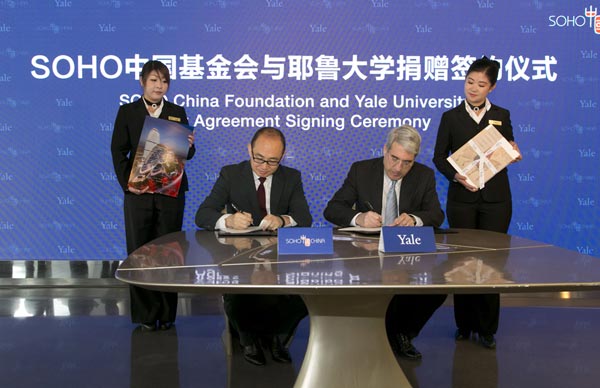|
 |
| SOHO China President Pan Shiyi and Yale University President Peter Salovey signed the deal in Wangjing SOHO in Beijing, China on Oct 29, 2014. [Photo/Provided to chinadaily.com.cn] |
The $10 million to Yale University is the second donation the couple has made, following a $15 million gift to Harvard University in July.
Through the SOHO China Foundation, a philanthropic organization funded by Pan and Zhang's real estate company SOHO China, the couple signed an agreement with Yale endowing the donation as "SOHO China Scholarships" to the university. The scholarships are to "create financial aid for Chinese students to obtain undergraduate education at the world's top universities".
"Every person's potential is like a hidden gem, and education is the tool that unlocks human potential," Pan, chairman of SOHO China, said in a news release on Wednesday.
"The SOHO China Scholarship's aim is to provide the best possible educational opportunities to the most outstanding students from the Chinese mainland, enabling them to maximize their potential in their contribution to mankind," said Pan.
Yale University President Peter Salovey said that the donation will help top Chinese national students access a Yale education. "This will encourage outstanding students from China to apply to Yale and assure them, should they be admitted, that we will meet their full demonstrated need for financial support," Salovey said.
Chinese students are the biggest group among Yale's international students, both among the graduate and undergraduate studies, according to Salovey.
The SOHO China Foundation, founded in 2005, aims to donate a total of $100 million in the future, with Harvard and Yale being the first two universities.
Lu Yong, the author of a newly-released book on philanthropy in China, Fundraising for a Cause, said many philanthropists?- especially those with a business background?- regard donation as a new form of investment.
"Such investments give them a different social recognition and value for sure," said Lu. "No matter where they donate?- which is a personal choice, really?- it shows their good intentions in helping those in need," Lu added.
However, the couple's choices have triggered education professionals in China to rethink problems with domestic education and their use of donations.
"It would be better if a Chinese company wanted to contribute more to its own country's education field," said Tan Songhua, a consultant with the Chinese Society of Education. "But his donations have also triggered a hot discussion about Chinese education. It has a favorable effect which may help to put attention back on Chinese education."
Liu Yunshan, a research scholar in education at Peking University, said that the donation will help diversify Chinese students at Yale, since currently the majority of Chinese students at Yale are from wealthier families.
"It will give students from lower income families an opportunity to get education at top universities such as Yale," she said.
Chinese universities should think about how to attract large donations from Chinese businessmen like this, Liu said.
"Chinese universities should learn to build trust between the university and businessmen, to make them trust that they would use donations wisely," she said.
Lu, a New York-based author, echoes Liu's view, saying Chinese universities should make more of an effort to attract those philanthropists.
"Universities like Harvard and Yale have perhaps done well to cultivate good relationships with these business people,"said Lu. "That's something Chinese universities should look to improving and they should become better self-promoters," she said.
Contact the writers at [email protected] and [email protected].
